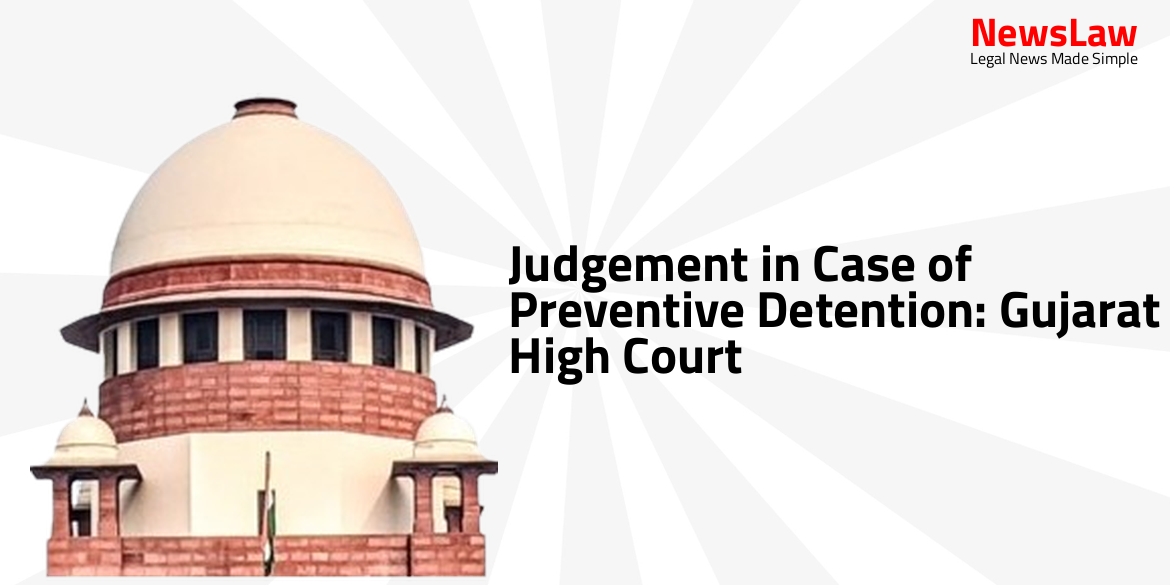Delve into the recent judgement by Gujarat High Court regarding preventive detention. The case involves a challenge to the detention order dated 28.10.2023 by the Police Commissioner, Ahmedabad. The petitioner has sought to quash the detention order in the interest of justice. Stay informed about the court’s analysis and conclusions in this significant legal matter.
Facts
- The petitioner has challenged the order of detention dated 28.10.2023 passed by Police Commissioner, Ahmedabad.
- The petitioner has been detained as a ‘dangerous person’ based on two registered offences against him.
- The main relief sought is to quash and set aside the impugned order of detention in the interest of justice.
Arguments
- The detaining authority had sufficient material on record to pass the order of detention as the petitioner himself confessed to commission of offences.
- The registration of offences under Sections of IPC and Arms Act alone cannot bring the case of the detenue within the purview of the definition under section 2(c) of the Act.
- Other supporting evidence considered by the detaining authority includes the drawing of a panchnama which led to the discovery of a vehicle involved in theft.
Analysis
- Unreasonable delay between order of detention and actual arrest of the detenu casts doubt on the genuineness of the detaining authority’s satisfaction.
- Delay in passing the detention order after receiving the proposal indicates indifference on the part of the detaining authority.
- Preventive detention aims to intercept before a person commits an act, requiring prompt action from detaining and executing authorities.
- Delay in arresting a detenu after the detention order vitiates the order and defeats the purpose of preventive action.
- The ‘live and proximate link’ between the grounds of detention and the purpose of detention is essential.
- Reference to the case of Ashok Kumar v. Delhi Administration emphasizing the objective of preventive detention in protecting society.
- Evaluation of the term ‘public order’ and its scope in preventive detention.
- Detaining authority did not consider the option of canceling bail as a method to prevent further offenses by the petitioner.
- The detaining authority overlooked the fact that the petitioner had been released on bail in both criminal cases cited for detention.
- The delay of almost two months in issuing the detention order after the petitioner was granted bail in the second offense was noted by the court.
- The court emphasized the need for a ‘live and proximate link’ between the prejudicial activities and the purpose of detention, pointing out the failure of the detaining authority to explain the delay in passing the detention order.
- The court highlighted the importance of understanding the distinction between disorder and public disorder in the context of preventive detention.
- The court referenced a recent Supreme Court decision emphasizing that preventive detention should not be used if other legal remedies like bail cancellation are available and appropriate.
- The submission of the proposal for preventive detention failed to bring to the detaining authority’s notice that the petitioner had been released on bail in both cases, which was crucial information omitted by the sponsoring authority.
- The detaining authority was faulted for not considering the possibility of seeking bail cancellation as an alternative to preventive detention.
- It is necessary to distinguish serious and aggravated forms of disorder that directly impact the community or public interest from minor breaches of peace with local significance
- Minor breaches primarily harm specific individuals and only secondarily affect public interest
- The line of demarcation is critical to differentiate between these two types of offenses
- When a citizen is detained under PASA without trial, the detaining authority must justify its action.
- If the detaining authority does not file a reply/counter-affidavit, the averments in the petition remain unchallenged.
- Simplicitor registration of FIRs does not necessarily indicate a breach of public order.
- The authority cannot invoke powers under PASA without relevant and cogent material supporting the detention.
Decision
- Direct service is permitted.
- The detenue is ordered to be set at liberty forthwith if not required in any other case.
- Rule is made absolute accordingly.
Case Title: SAVENDRA BALADIN YADAV THROUGH BAJENDRA BALADIN YADAV Vs. STATE OF GUJARAT
Case Number: R/SCA/19622/2023



